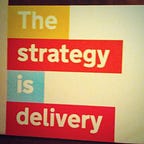You don’t need a Digital Team to build good Services.
Given that I’ve worked in Digital Teams building good services for over ten years this might be considered an odd statement. To explain……
I joined a large programme four months ago to help lead the development of a new service. A digital team had been in place for a few months already but during our first meeting the team were very honest and explained how things weren’t working.
This Team of experts will do their part and then pass it over…..
As with most large organisations the separate business areas have their own management structures, different cultures, approaches and priorities. All perfectly understandable and reasonable. The more traditional approach has been that the policy gets formed, the technology is then commissioned to build some screens and rules, and the operations have to make it all work and manage the feedback.
Whilst some teams may be able to work through these structures and ways of working, the kind of services required on this programme are so dependent on shaping the policy (with legislation and operating rules) and operational procedures delivered by thousands of people, that it was proving difficult for the digital team to influence the development of the whole service.
The Digital Team
As a result, the right conversations weren’t really happening, work on the service was being done in several places, with different approaches. The digital team were focusing on the technology, the policy and programme team continued to work on their priorities and the operational teams remained worried that it would all be passed to them to operate and manage when finished.
The Service Team
The scale of the work along with the need and importance to deliver to users as quickly as possible has made this a priority for improvement. But with some very impressive leadership across all of the areas there was a consensus to create a single team to develop and deliver the new service.
So the team is now a mixture of people from policy and operations working alongside user experience, design, content and technology (amongst other roles). As a team we are working in a pragmatic way. We aren’t trying to answer all of the questions at once, we will develop the service in a manageable and low risk way, getting the input from external and internal users of the service.
It’s still early days but over the last 8 weeks the team have conducted a focused piece of work to help set the foundations of the service. This includes:
- reviewing the problem we are trying to fix (this has led to policy being refined)
- understanding what the users (including internal ones) of the service need. By doing lots of research (this will continue throughout) we have spoken to far more users in recent weeks than had been done previously over several months. This was partly as the operational people on the team have helped to open more doors, and the programme has been able to remove some blockers which the previous digital team weren’t positioned to do before.
- started to think and sketch out how the work can be delivered in more manageable steps (this includes the technology development)
- created a culture of shared ownership, so everyone owns the success of this work, and we share the risks and challenges.
Changing the approach — hearing directly from people that will use the service
The team has provided a playback of the work done every fortnight and the most recent one had over 200 people attend. This included a summary of some of the interviews with people that will use the service, bringing out the fact that the service will have a significant impact on their businesses, livelihoods, families and our wider environment over many years.
In the coming weeks we will play back more of this research, and I’ve already seen and heard really positive feedback on how valuable and insightful people on the programme are finding it to hear directly from users.
This will lead to the team developing better services, designed around the feedback and insights provided. There will be continuous and incremental improvement over a long period of time, but the focus on quality will help ensure a range of outcomes are achieved and our users will be listened to and have the opportunity to influence and shape the design of their services.
